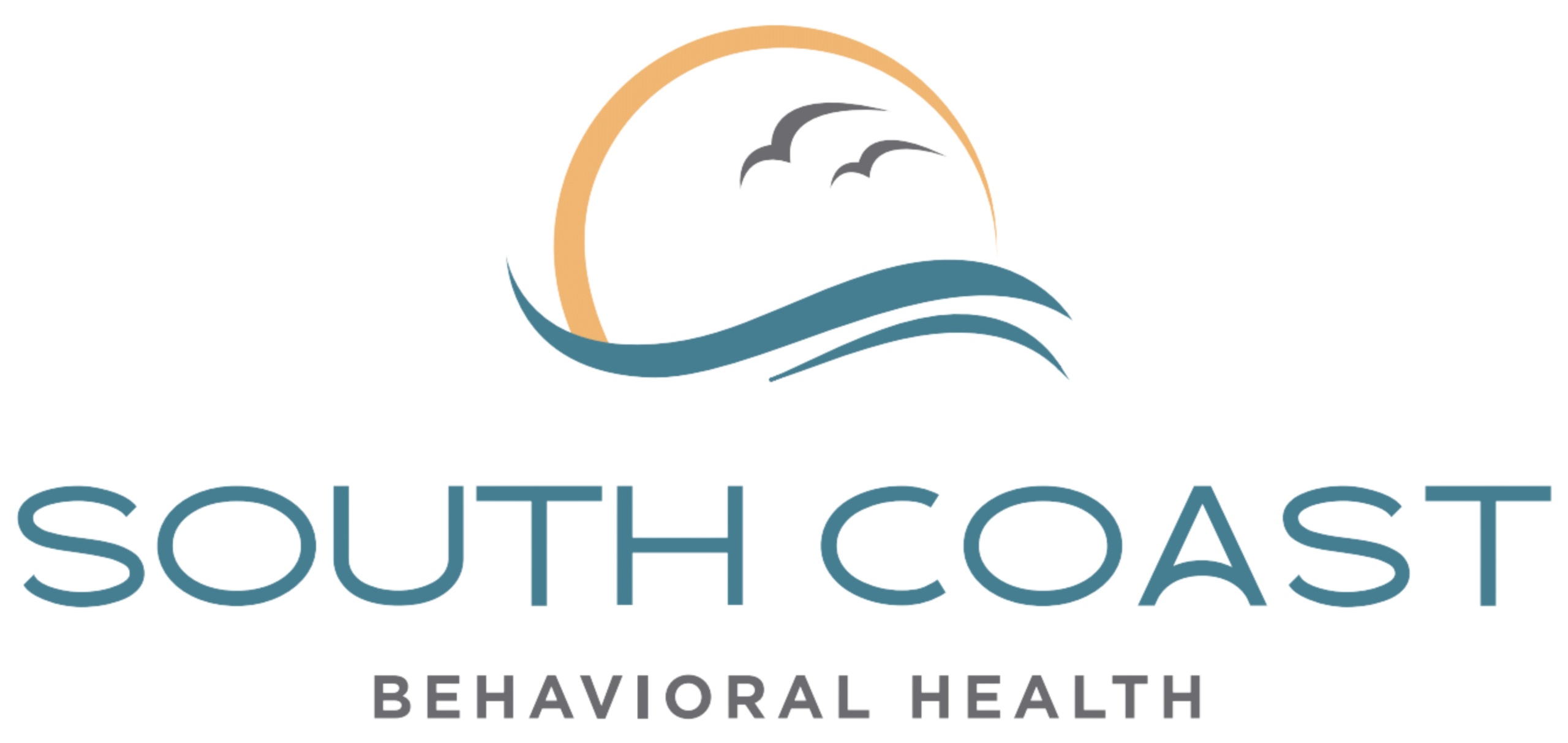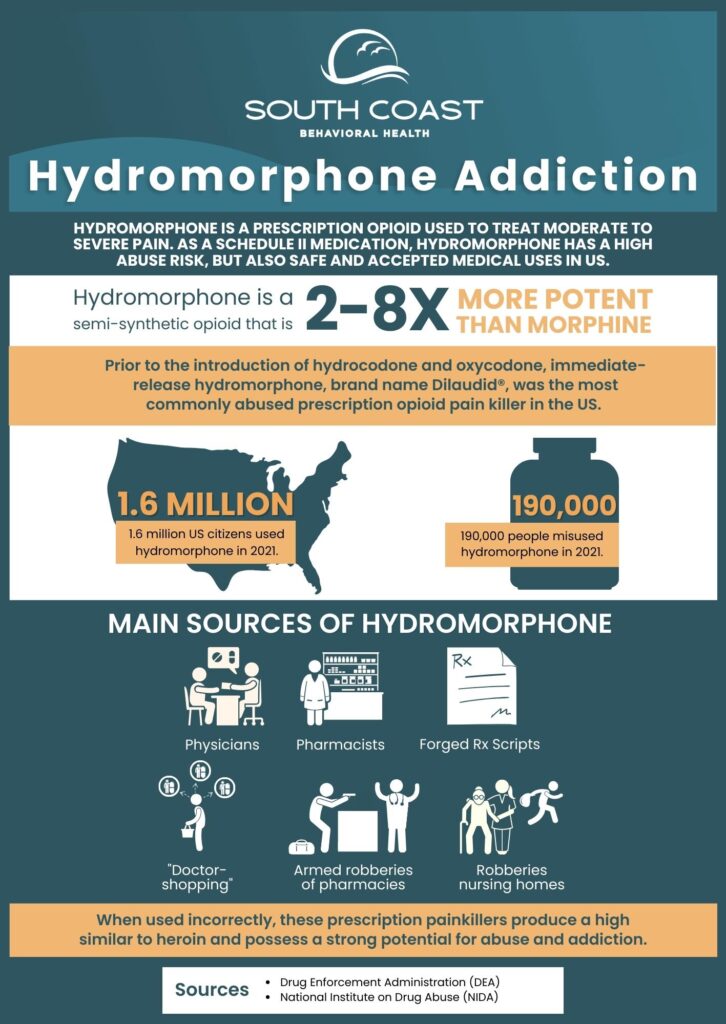Hydromorphone Addiction
Hydromorphone addiction is a pressing concern. Individuals become dependent on the drug even when it’s initially prescribed for legitimate medical reasons. This addiction can lead to Opioid Use Disorder (OUD) and have severe physical, mental, and behavioral consequences.
Hydromorphone, a potent opioid painkiller, is a medication prescribed to manage severe pain. However, people can become dependent on the drug, even if they are taking the opioid for legitimate medical reasons. Anyone who takes this drug runs the risk of developing hydromorphone addiction. Likewise, those who abuse hydromorphone also run the risk of overdosing on the medication if they take too much.
To comprehend the scope of opioid abuse, it is imperative to grasp its risks, signs, and symptoms, as well as the array of treatment options available for overcoming hydromorphone addiction.

What Is Hydromorphone Addiction?
Hydromorphone is a potent opioid medication used to relieve severe pain. It belongs to the class of drugs known as opioids, which includes substances like morphine and oxycodone. When prescribed, it typically comes in the form of oral tablets, liquid solutions, or injectable solutions to manage pain after surgery, injury, or in severe cases of chronic pain.
However, despite its legitimate medical uses, hydromorphone carries a significant risk of addiction and abuse. This is mainly due to its powerful pain-relieving effects, which can also produce feelings of euphoria and relaxation. In some cases, individuals may start using hydromorphone for its pleasurable effects, which can ultimately lead to misuse and addiction. Taking hydromorphone affects the central nervous system and can lead to an opioid dependence if not treated.
What Are the Signs and Symptoms of Hydromorphone Addiction?
If you or a loved one takes hydromorphone, you may notice certain indicators or red flags pointing to an opioid use disorder (OUD) or hydromorphone addiction. To prevent an opioid use disorder or hydromorphone addiction from developing, it is important to recognize the signs and symptoms as early as possible.
Common signs and symptoms of hydromorphone addiction can include:
- Increased Tolerance: Needing higher doses of hydromorphone to achieve the same effect.
- Psychological dependence: The belief that you need to keep using hydromorphone.
- Physical Dependence: Experiencing withdrawal symptoms when not using hydromorphone.
- Physical symptoms: Constricted pupils, clammy skin, shallow breathing, constipation, drowsiness.
- Drug cravings: Frequent, intense desires to use hydromorphone.
- Secrecy: Being secretive about hydromorphone use.
- Lack of control: Inability to reduce or quit hydromorphone despite wanting to stop.
- Doctor shopping: Seeking multiple hydromorphone prescriptions from different healthcare providers.
- Risky behavior: Participating in risky behaviors while under the influence and/or acquiring hydromorphone.
- Financial Issues: Spending significant money on acquiring hydromorphone.
- Neglecting responsibilities: Failing to meet work, school, or familial obligations.
- Social withdrawal: Isolating from family and friends.
If you are concerned about yourself or a loved one’s use of hydromorphone it is important to seek professional help. At South Coast, we provide a safe and confidential environment for individuals struggling with hydromorphone addiction. Contact us today to learn more about our hydromorphone addiction treatment program.
Why Is Hydromorphone Dangerous?
Hydromorphone is considered dangerous for various reasons, encompassing its physical, mental, and behavioral effects:
- Highly Addictive: Hydromorphone is an opioid, making it highly addictive. Its potent pain-relieving properties can lead to physical dependence and addiction with prolonged use.
- Overdose Risk: The drug comes with a high risk of overdose, particularly when taken in larger quantities or in ways other than prescribed. Overdosing on hydromorphone can result in respiratory depression, which can be fatal.
- Withdrawal Symptoms: When someone dependent on hydromorphone attempts to quit or cut down on use, they may experience severe withdrawal symptoms, such as muscle pain, nausea, and anxiety. This often drives individuals to continue using the drug to avoid withdrawal discomfort.
- Negative Mental Health Effects: Hydromorphone use can lead to mental health issues, including depression and anxiety. Prolonged use can exacerbate these conditions, creating a cycle of use to self-medicate.
- Impaired Cognitive Function: Hydromorphone can impair cognitive functions, making it dangerous when individuals need to remain alert and focused, such as when driving or operating heavy machinery.
- Social and Behavioral Consequences: Addiction to hydromorphone can lead to social isolation, job loss, financial problems, and strained relationships. These behavioral consequences often accompany substance misuse and can have severe and lasting impacts on an individual’s life.
- Legal Consequences: Obtaining hydromorphone without a prescription or using it in ways other than prescribed can lead to legal issues.
Hydromorphone’s dangerous nature highlights the importance of using it only under the guidance of a medical professional and strictly adhering to prescribed dosages. Additionally, individuals should be aware of the potential risks and seek help promptly if they suspect they are developing a problem with this medication.
Hydromorphone Addiction and Mental Health
Hydromorphone addiction and mental health are deeply intertwined. Individuals struggling with hydromorphone addiction often face co-occurring mental health issues. This dual diagnosis, also known as co-occurring disorders, occurs when substance use disorders like hydromorphone addiction coincide with mental health conditions like depression, anxiety, or bipolar disorder.
The relationship between the two is complex. Substance abuse can exacerbate pre-existing mental health issues, and vice versa. For example, individuals may turn to hydromorphone to self-medicate emotional pain, which can further intensify their addiction. Co-occurring disorders are common, with roughly 9.2 million adults in the United States experiencing them, according to the Substance Abuse and Mental Health Services Administration (SAMHSA).
People with dual diagnoses often require integrated treatment that addresses both their addiction and mental health issues. Recognizing and addressing the connection between hydromorphone addiction and mental health is critical for effective and comprehensive care. The stigma surrounding both addiction and mental health can deter individuals from seeking help, which makes it crucial to provide supportive and nonjudgmental environments for those affected. It’s important to promote awareness and understanding of co-occurring disorders and emphasize the significance of treating the whole person to achieve lasting recovery and mental well-being.
Wondering if Your Insurance Covers the Cost of Treatment for Hydromorphone Addiction?
Hydromorphone Addictions Facts and Stats
Statistics show that the United States is facing an opioid epidemic, with numerous cases of addiction and overdose related to drugs like hydromorphone. The misuse of prescription opioids has been a significant contributor to this crisis, with some individuals transitioning from legal medical use to illegal and dangerous practices.
Recent reports on hydromorphone use and abuse include:
- Hydromorphone Use: 1.6 million US citizens used hydromorphone in 2021.
- Hydromorphone Misuse: 190,000 people reported misusing hydromorphone in 2021.
- Hydromorphone Abuse: Prior to the introduction of hydrocodone and oxycodone, immediate-release hydromorphone, brand name Dilaudid®, was the most commonly abused prescription opioid pain killer in the US.
Even when prescribed, hydromorphone can be dangerous if not taken as directed, as it may lead to physical dependence, addiction, and adverse health consequences. It’s crucial to be aware of the potential risks and to use this medication only under the supervision of a medical professional to minimize these dangers.
When Do You Need Hydromorphone Addiction Treatment?
Seeking hydromorphone addiction treatment is essential when an individual’s use of the drug begins to negatively impact their life. Some signs that it’s time to seek help for a hydromorphone use disorder include:
- Loss of Control: When one can’t limit or control their use of hydromorphone, despite trying to do so.
- Cravings: Overwhelming urges or cravings to use the drug.
- Social and Occupational Problems: When drug use leads to issues in relationships, employment, or other aspects of life.
- Health Deterioration: Physical or mental health problems related to drug use.
- Failed Attempts to Quit: Unsuccessful efforts to stop or reduce use.
Hydromorphone addiction can lead to severe problems, including overdose, legal issues, financial troubles, and damaged relationships. Recognizing these signs and seeking professional help can prevent further harm and lead to recovery.
Hydromorphone Addiction Treatment Options
If you or someone you care about is exhibiting any of these signs, it may be time to seek professional help. Treatment options for hydromorphone addiction may include cognitive behavioral therapy (CBT), individual and group counseling, and medications such as buprenorphine or naltrexone to reduce cravings. A combination of these approaches can be useful in helping an individual overcome their addiction and maintain long-term recovery.
Hydromorphone addiction can be treated effectively with a combination of evidence-based approaches. Here are some of the treatment options available:
- Medication-Assisted Treatment (MAT): MAT can help reduce cravings and withdrawal symptoms by using medications like buprenorphine or methadone. These medications are administered under medical supervision to facilitate recovery.
- Psychotherapies: Cognitive-behavioral therapy (CBT), contingency management, and motivational interviewing (MI) are commonly used psychotherapies. They aim to change negative thought patterns, reinforce positive behaviors, and enhance motivation for recovery.
- Holistic Treatment: Complementary therapies, like yoga, mindfulness meditation, and art therapy, can help individuals address the physical, emotional, and spiritual aspects of addiction. These holistic approaches can improve overall well-being.
- Residential or Outpatient Programs: Depending on the severity of the addiction, individuals can choose between inpatient (residential) or outpatient treatment programs. Inpatient programs offer a more immersive and structured approach, while outpatient programs provide flexibility for those with strong support systems at home.
- Individual and Group Therapy: Individual counseling allows for personalized treatment plans, while group therapy offers peer support and a sense of community during recovery.
Treatment for hydromorphone addiction should be tailored to the individual’s needs and may involve a combination of these approaches to maximize effectiveness.
Hydromorphone Addiction Treatment at South Coast Behavioral Health
South Coast Behavioral Health (SCBH) offers a comprehensive and compassionate approach to hydromorphone addiction treatment. With a range of levels of care, SCBH can meet individuals at their specific needs, providing a customized recovery journey. Here are the levels of care offered at SCBH:
- Medical Detoxification: The journey to recovery often begins with medical detox. It’s a safe and monitored process that helps individuals manage withdrawal symptoms as the drug leaves their system. This crucial first step ensures physical stabilization.
- Residential Treatment: For those requiring a more intensive approach, SCBH’s residential treatment program provides 24/7 care and a structured environment. It includes individual and group therapies, counseling, and a focus on building essential recovery skills.
- Partial Hospitalization Program (PHP): The PHP is a step-down program that offers structured treatment during the day while allowing patients to return home or to a sober living environment in the evenings. It helps individuals transition to daily life in recovery.
- Intensive Outpatient Program (IOP): The IOP provides flexibility and allows patients to continue with their daily responsibilities while receiving therapy and support. It’s an ideal option for those who need ongoing care but cannot commit to a full-time residential program.
As individuals progress in their recovery, the outpatient program provides ongoing support and access to therapy while allowing them to resume their daily lives.
Get A Confidential Assessment From A Recovery Specialist
Hydromorphone Addiction Treatment in Orange County, California
At South Coast Behavioral Health, our treatment approach is highly individualized, incorporating evidence-based practices, holistic therapies, and a focus on mental health. Our addiction treatment center’s team of dedicated professionals seek to ensure that each person receives the right level of care and support to overcome hydromorphone addiction and build a foundation for lasting recovery.
Our center provides hydromorphone abuse treatment for men within our medical detox and residential treatment centers in Irvine, CA.
We offer hydromorphone addiction treatment for women at our medical detox and residential treatment centers in Huntington Beach, CA.
Our center offers hydromorphone addiction treatment for men within our residential inpatient facility in Costa Mesa, CA.
We provide hydromorphone abuse treatment during our PHP and IOP programs in Newport Beach, CA.
If you are struggling with hydromorphone addiction and feel you need treatment, our admissions team is here to provide support and guidance. Opioid addiction doesn’t have to ruin your life. If you’re using opioid pain medicines or any prescription drugs, a treatment center can help. Contact us today to start your recovery journey.

















